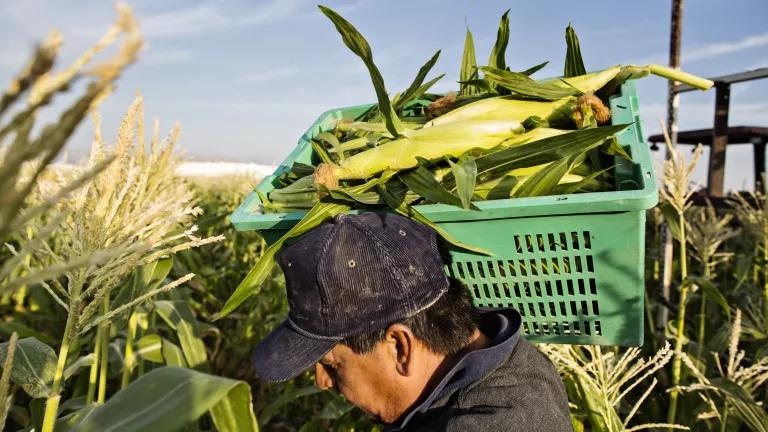Food Waste Generators Now Required to Recycle in New York
New York's law adds to the growing drumbeat of adoption of these laws, and we look forward to seeing similarly robust programs in other states in the years to come.
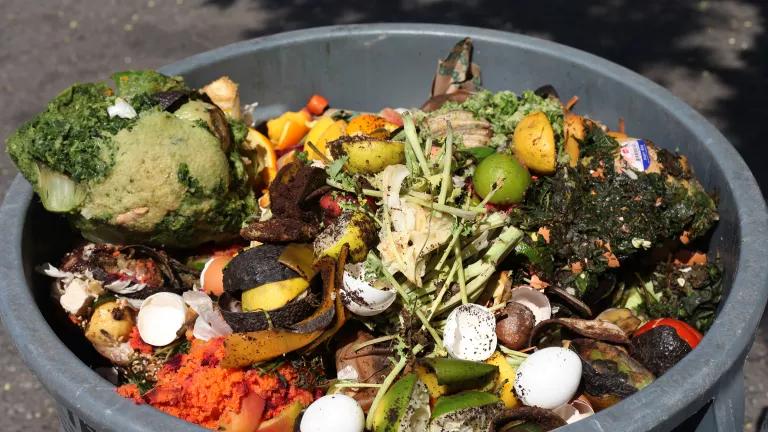
As of January 1st, New York joined the growing list of states with bans or other restrictions on landfilling food waste. Alongside California, Connecticut, Massachusetts, Rhode Island, and Vermont, New York now requires its largest generators of food waste to keep any food out of landfills and instead donate edible food or recycle food scraps—reducing methane emissions, creating jobs, and returning vital nutrients to the soil.
The United States Protection Agency's food recovery hierarchy is a guiding framework used widely throughout food waste work. If we can prevent food waste from happening in the first place and ensure that all the food that is produced is either eaten by people or animals, the resources invested in its production, transportation, storage, etc. were not in vain. As demonstrated in the image below, solutions that are higher up on the hierarchy bring greater environmental, climate, economic, and social benefits.
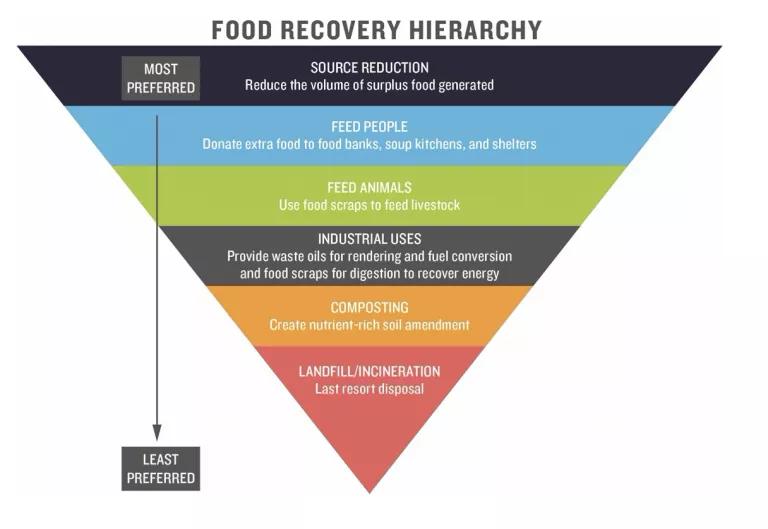
US EPA
The benefits of organic waste bans are multi-pronged:
- Climate emissions are significantly reduced: Climate emissions resulting from wasted food occur at every stage of the food system: growing, manufacturing, transporting, and storing food. In addition, when food waste rots in a landfill, it releases methane, a greenhouse gas up to 80 times more potent than CO2.
- Jobs are created: Composting facilities on average can provide twice as many jobs as landfills and four times more jobs than incinerators. Expanding food waste recycling infrastructure and green infrastructure projects that use finished compost could generate an estimated 18,000 jobs annually through 2030. For example, in its first few years of implementation, Massachusetts' organic waste ban supported 900 new jobs and $175 million in industry activity.
- Soils are healthier: Recycling food scraps into compost provides an opportunity to build healthier soils on our farms, in our parks, and in our gardens and backyards. Applying compost to soil helps replenish nutrients, add carbon, increase water retention and nutrient storage capacity, and reduce the need for fertilizers and pesticides manufactured from fossil fuels.
Importantly, organic waste bans have also demonstrated success in helping to increase the prevention of food waste in the first place and to increase surplus food donation. For example, since the implementation of an organic waste ban in Vermont, surplus food donation in the state has tripled.
New York's Food Donation and Food Scraps Recycling Act
New York's Food Donation and Food Scraps Recycling Law officially went into effect on January 1st of this year. This law, passed as part of the New York State budget in 2019, requires businesses and institutions that generate an annual average of two tons of wasted food per week or more to:
- donate excess edible food; and
- recycle all remaining food scraps if they are within 25 miles of an organics recycler (composting facility, anaerobic digester, etc.).
The law does not apply to New York City (which already has a local law in place requiring the diversion of food scraps from disposal), hospitals, nursing homes, adult care facilities, K-12 schools, or farms. This new law is a critical step in beginning to stem the tide of food going to waste here in New York, where an estimated 7.8 billion pounds of food is going to waste each year, generating more GHGs than four million passenger cars driven for a year.
What's most exciting about New York's Food Donation and Food Scraps Recycling Law is the explicit codification of the food recovery hierarchy and inclusion of solutions that go further up the hierarchy including food rescue and encouraging food waste prevention.
Notably, on food rescue, the law requires all designated generators to separate wholesome food and offer it for donation. On prevention, the law requires the New York State Department of Environmental Conservation (DEC) to develop educational materials on food waste prevention and encourage municipalities to share these materials with their residents as well.
In addition to the law itself, the state has allocated funding that supports food waste work from prevention through recycling—through funding for municipalities and technical assistance for generators. The state has also made funding available for the food rescue community to improve their infrastructure, such as by adding refrigerated trucks and storage needed for increased donations. These kinds of actions further up the hierarchy are essential to more fully realizing the environmental and social benefits of preventing food waste.
Of course, the impact of the bill in increasing the total amount of food scraps recycled across the state is also tremendous and can have huge climate mitigation potential. Landfills are the third-largest source of anthropomorphic methane emissions in US and food waste comprises the largest single material sent to landfill.
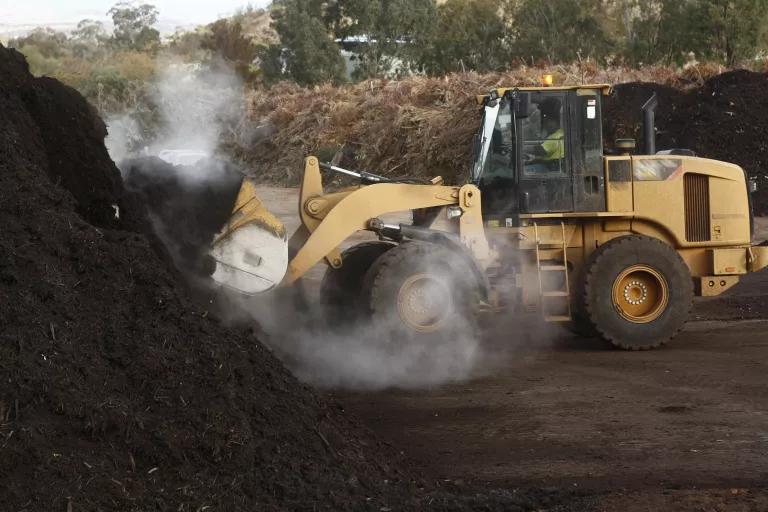
Organic Waste Ban Examples from Around the U.S.
Legislation similar to New York's Food Donation and Food Scraps Recycling Law has been introduced, passed, or is being implemented around the country, and the impacts to date are powerful.
California's SB1383 went into effect on January 1, 2022. The goal of SB1383 is to reduce the organic waste sent to landfills by 75% (from 2014 levels) by 2025, including from businesses and homes.
Importantly, it requires at least a 20% reduction in currently disposed edible food, instead requiring that food to be redistributed for human consumption. While the law recently went into effect, in the lead up, the state has already funded $140 million in grants and loans for organic waste and food rescue infrastructure and logistics.
Vermont's Universal Recycling Law bans food waste in the trash, among other items, and aims to meet the state's 50% recycling goal. Already, Vermont's Department of Environmental Conservation estimates that the number of food scrap haulers has more than tripled since 2012, from 12 to 45, and there has been a huge increase in volume of food scraps collected by composting facilities.
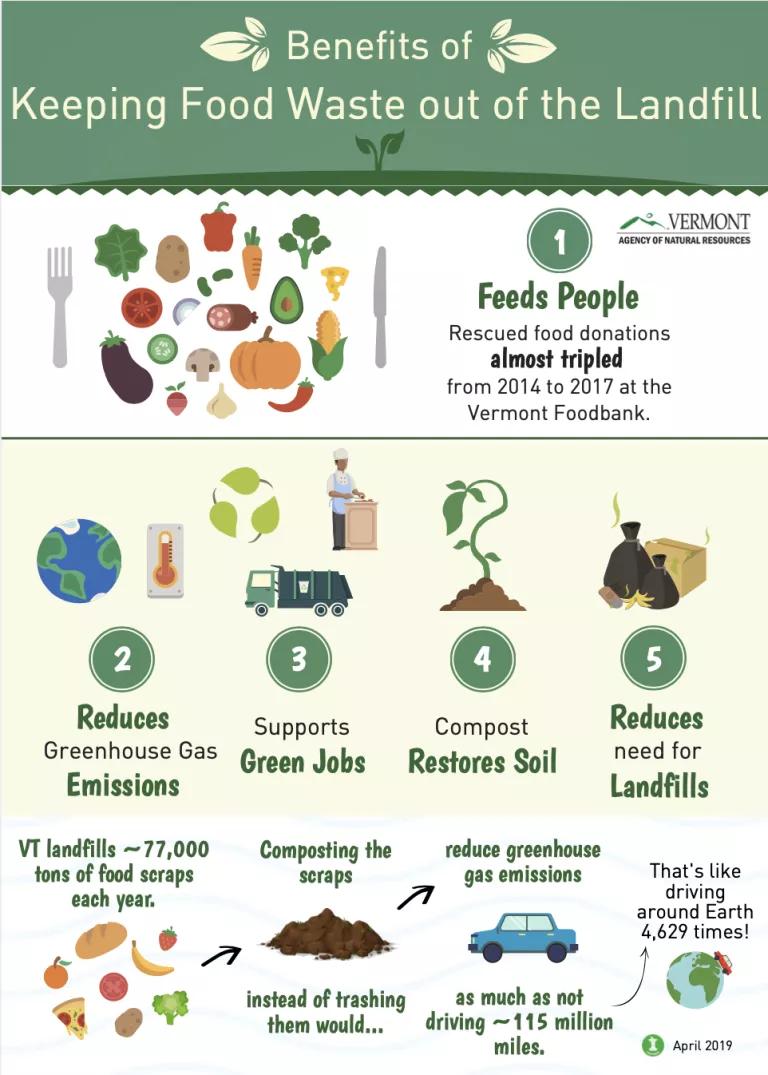
As a result of critical efforts by local organizations, similar efforts are underway in states and cities around the country, like Maryland.
Organic waste bans have proven to be powerful policies that can help states meet their climate and sustainability goals, increase food donation, and create jobs. New York's law adds to the growing drumbeat of adoption of these laws, and we look forward to seeing similarly robust programs in other states in the years to come.





